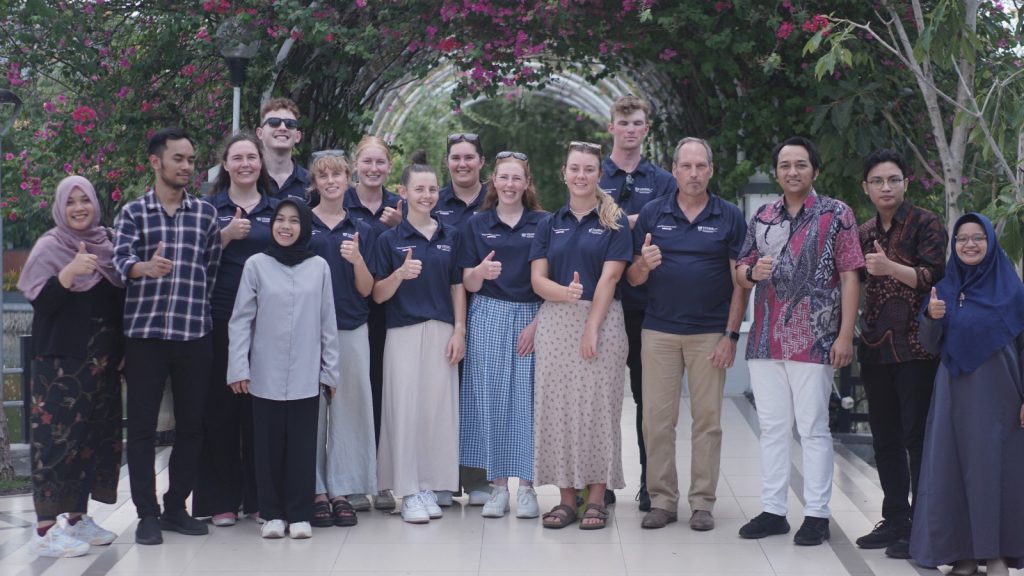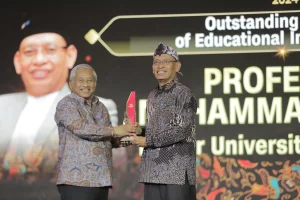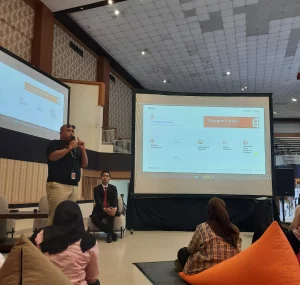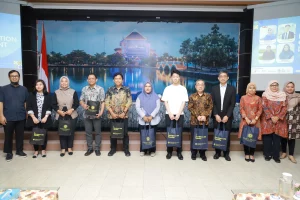UNAIR NEWS – Islamic Economics Undergraduate Study Program (EKIS), Faculty of Business Economics (FEB), Universitas Airlangga (UNAIR) welcomed nine students from the Faculty of Agribusiness and Commerce, Lincoln University, New Zealand. They carry out a full-time inbound study program starting at UNAIR from Sunday, Dec 31, 2023, to Mar 27, 2024. This program focuses on Food Security, Sustainability, and Islamic Finance.
In an interview with UNAIR NEWS, Bayu Arie Fianto SE MBA PhD as the person-in-charge and UNAIR Islamic Economics Undergraduate Study Program Coordinator revealed that this summer school program consists of four classes and several cultural activities.
The four classes are Overview of Agribusiness in Indonesia; Academic Reform and Sustainability of Higher Education in Indonesia; Indonesia, Muslims, Poverty, and Islamic Finance; and Exploring the Role of Organization Creativity and Open Innovation in Enhancing SMEs Performance in Indonesia.
This program stems from concerns about the global crisis which impacts food security. This program allows Lincoln University students to explore the potential of food commodities in each country, especially Indonesia, to achieve food security.
“Therefore, we provide lectures and hold discussions about agriculture in Indonesia to find solutions and innovations regarding food security,” concluded Bayu.
This program also offers learning related to sustainability. “This Earth should be sustained not only for the current generation but also for the future generations. Each field of activities must be aimed toward sustainability, encompassing the social, economic, environmental, or legal pillars of governance,” he explained.
Furthermore, Bayu also made an emphasis on Islamic economics and finance. He feels that Islamic finance is very important in starting a business, especially in a Muslim country like Indonesia with a Muslim population of around 87 percent which of course really pays attention to halal aspects.
“The program also teaches foreign students that to start a business in Indonesia, we must understand the aspects of muamalah of business sustainability. Because Muslims want to consume halal food, want to wear halal fashion, beauty products, and financial services, and even travel to halal–friendly places,” he said
Learning in the Field
Apart from in-class learning, the students were also taken on campus and city tours to several industrial and historical places in Surabaya for hands–on learning. “We took the students to some industries in Indonesia, including PT. Garam, Ecoton NGO in Gresik. We took them to a corporate-based university at UISI as well, and a community service program with seaweed farmers in Sumenep,” said Bayu.
Not only academic learning, students were also invited to explore Indonesian culture. They learn the language, culture, and traditional games and cook Indonesian food.
During the program, students also got the challenge to buy products in traditional markets and modern markets in Surabaya. “This aims to introduce students to the differences in traditional and modern market in Indonesia. “In this case, students will be taught to bargain using Indonesian, as well as observing goods between the two markets,” concluded Bayu.

Introducing Sharia Economics
Through the inbound program, Bayu sought to show students that Islamic Economics is not exclusively for Muslims. It is also aimed at non-Muslims who are interested to learn about Islamic economics.
This is proven by the enthusiasm of non-Muslim students from New Zealand to study food security, sustainability, and Islamic finance at UNAIR. UNAIR Islamic Economics Undergraduate Study Program has gained ABEST21 and FIBAA (premium seal) international accreditation, marking its credibility to be a learning forum for international students.
“It shows that UNAIR is the first reference for campuses in New Zealand to study Islamic economics, Islamic social finance, and sustainability,” concluded the Head of the UNAIR Islamic Economics Study Program.
The program is expected to increase collaboration between researchers in the UNAIR Islamic Economics study program and Faculty of Agribusiness and Commerce at Lincoln University.
He also hoped that there would be more non-Muslim-based-campuses studying Islamic Economics, reiterating that Islamic Economics study program is not limited to Muslims only.
Author: Aidatul Fitriyah
Editor: Khefti Al Mawalia








